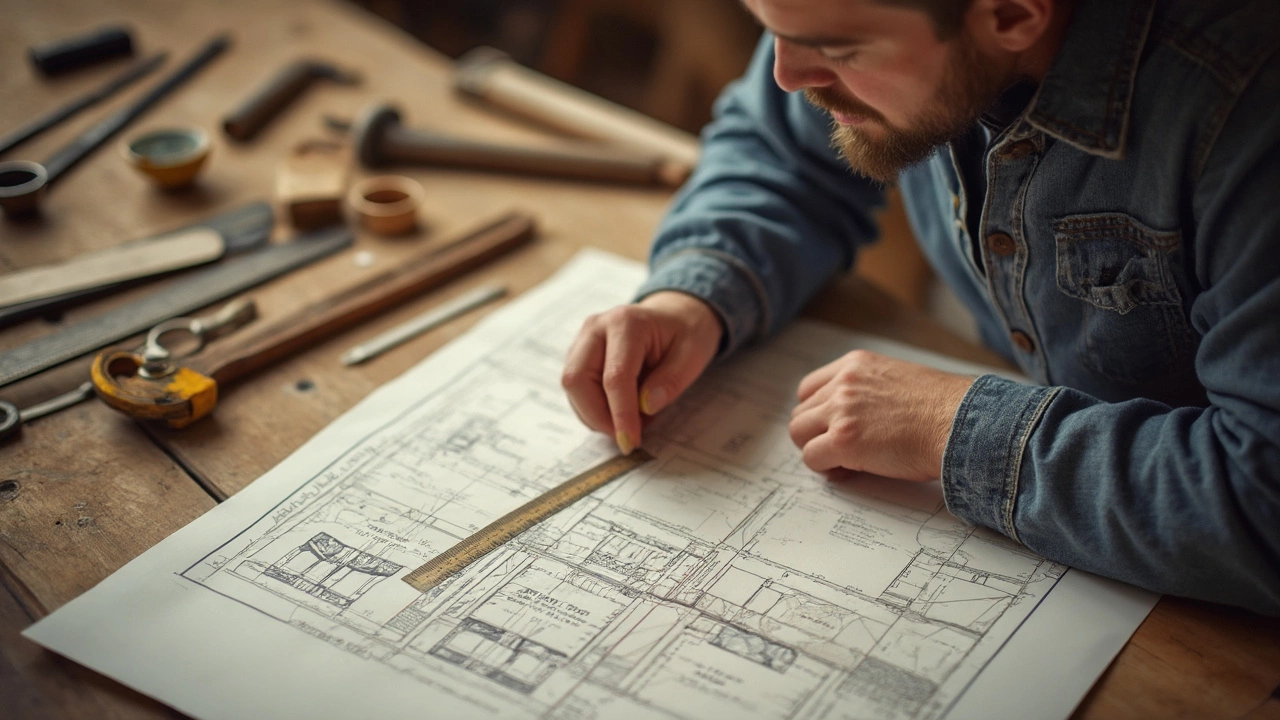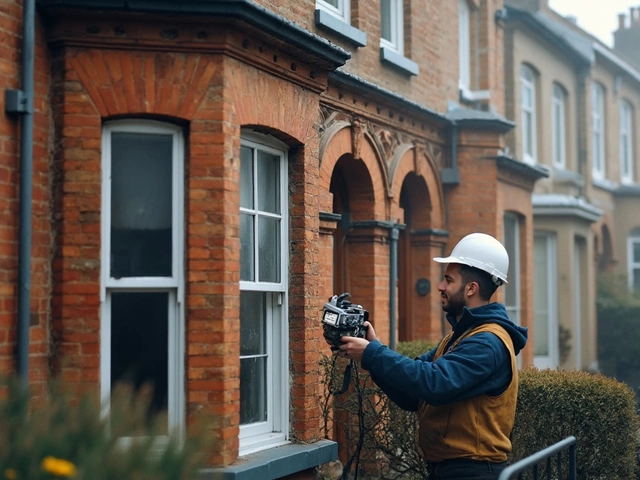Ever wondered what a building contractor actually does? These folks are at the center of almost every construction project you see around. They're the ones making sure everything runs smoothly, from coordinating the crew to ensuring that your dream home doesn't collapse the next day.
In simple terms, a building contractor is like the project manager on a construction site. They’re the go-to person, taking care of plans, materials, and labor, while keeping things on schedule and within budget. Without them, a construction site would be a chaotic mess with no one knowing what to do next.
Getting a competent contractor can make or break a project. They don’t just boss people around—they’re responsible for serious stuff like making sure all the work meets the local building codes and safety standards. So, when you're choosing one, it pays off to pick someone with a solid track record.
- Defining a Building Contractor
- Key Responsibilities and Tasks
- The Importance of Experience
- Navigating Legal and Regulatory Requirements
- Tips for Choosing the Right Contractor
Defining a Building Contractor
Alright, so what exactly is a building contractor? Think of them like the conductor of a symphony, but instead of musical notes, they’re dealing with plans, materials, and a crew of workers. A building contractor is a person or company hired by a client to take responsibility for the day-to-day oversight of a construction site, management of vendors and trades, and the communication of information to all involved parties throughout the course of a building project.
These guys wear many hats—like managing project timelines, budgets, and ensuring quality standards. They essentially translate a set of plans into reality, and without them, those blueprints would sit gathering dust rather than turning into homes or skyscrapers.
According to the U.S. Bureau of Labor Statistics, there were over 800,000 construction managers in 2020, and that number is only growing. That’s a ton of folks making sure buildings go up safely and efficiently.
The National Association of Home Builders says,
"A good contractor brings a depth of knowledge and experience to any project, guaranteed to save time, money, and headaches."
Building contractors ensure the project follows all the local regulations and safety codes. This means a lot of paperwork, like permits and inspections, among other compliance matters. Without their oversight, things could quickly derailed.
To put it simply, a contractor is crucial not only for constructing a building but for safeguarding the investment in your project. Hiring the right one means choosing someone who will preserve your dreams and your pocketbook.
Key Responsibilities and Tasks
So, what do building contractors actually do? Their work isn’t just about wearing hard hats and pointing fingers. They juggle a bunch of different tasks that keep everything on track and up to code. Let's break it down.
Project Planning: Building contractors first figure out the blueprint for the entire construction project. They collaborate with architects and engineers, making sure everything's set and feasible. They create detailed work schedules and assign duties to ensure a smooth workflow from day one.
Managing Subcontractors: Contractors don’t work alone. They hire and manage a team of specialists, like electricians and plumbers, to handle different parts of the project. It's their job to make sure everyone’s on the same page and working together efficiently.
Quality Control: They’re like the quality police on the site, checking that all materials and work meet the necessary standards. A contractor is the person who ensures that your new roof can handle the winter snow, not just light rain.
Compliance and Regulation: Ever wondered who handles all those boring permits and safety inspections? That’s the contractor. They navigate the maze of legal and regulatory requirements to keep everything legit and safe.
Budget Management: Keeping the project within budget is a major responsibility. Contractors meticulously track expenses, negotiate costs with suppliers, and adjust plans to stay financially on target. This balancing act ensures that you don't end up with an empty bank account before your house has a roof.
Handling all these responsibilities might seem overwhelming to us mere mortals, but a seasoned building contractor thrives on this complexity. Their expertise and organization are the backbone of any successful construction project.

The Importance of Experience
When it comes to picking a building contractor, their experience is something you really don’t want to overlook. Why? Because an experienced contractor is like that friend who’s always got your back—they know what they’re doing, can tackle problems head-on, and have a wealth of knowledge about the industry.
A seasoned building contractor has likely dealt with everything from unexpected weather delays to difficult zoning regulations. They’ve learned to adapt and can offer creative solutions that less experienced folks might overlook. This kind of problem-solving skill is priceless, especially when things go sideways.
Experience also means a contractor has a portfolio of completed projects. This isn't just bragging rights; it’s proof of their ability to deliver quality work. Plus, it gives you the chance to check out their past work, get in touch with previous clients, and see firsthand what they can do.
And let’s not forget about the network an experienced contractor brings. They often have connections with reliable subcontractors and suppliers, which can mean better prices and higher quality materials. It's like having a VIP pass to the best resources in town.
Interestingly, a study by the Construction Management Association in 2024 showed that projects led by contractors with over ten years of experience had a 35% higher rate of client satisfaction compared to industry newbies. That’s a pretty compelling reason to value experience, isn’t it?
| Years of Experience | Client Satisfaction Rate |
|---|---|
| 10+ years | 85% |
| Less than 5 years | 50% |
In short, the more experience a building contractor has, the better equipped they are to manage unexpected challenges and ensure the job gets done right. So, always weigh experience heavily when choosing someone to lead your construction project.
Navigating Legal and Regulatory Requirements
If you're dipping your toes into a construction project, understanding the legal and regulatory landscape is like trying to solve a jigsaw puzzle where all the pieces look pretty much the same. A good building contractor acts like your GPS in this maze, keeping you compliant with local laws and ensuring you avoid any legal headaches down the road.
First off, a contractor knows the ins and outs of building codes. These are the rules that dictate everything from the height of your house to the strength of your foundation. They change now and then, so having someone clued up on the latest is key. Missing a step here can mean expensive fines or, worse, being told to tear down and start over. Ouch.
Your construction management expert will also deal with permits. No matter if you're adding a small deck or erecting a skyscraper, you'll need the right paperwork. Contractors handle this upfront, making sure all permits are approved before a single nail is driven in.
Insurance is another biggie. A legit contractor helps ensure that all necessary insurance coverages are in place—be it liability insurance or workman's comp. This isn't just for peace of mind; it's often a legal must-have.
- Make sure your contractor is licensed in your area; not just anywhere, but where your project is happening. It’s a common hiccup to assume all licenses are created equal.
- Double-check if your project needs any special permits, like environmental permits, especially if it’s near sensitive areas like wetlands or historical sites.
A little known fact—nearly 60% of construction delays are tied to regulatory hang-ups. So having a contractor who's on top of these things can actually help keep your timeline on track. That's more than just a good thing; it’s essential for success.

Tips for Choosing the Right Contractor
Picking the right building contractor can feel like a big decision—it kinda is. A good contractor can make sure your project goes off without a hitch, while a bad one can leave you with endless headaches.
So where do you start? Begin by having a clear idea of what you need. Different projects might need different expertise. For a custom home build, you might want someone with a solid background in residential construction. If it's a commercial project, credentials in that field are key.
Once you know what you're after, ask around. Word of mouth is gold. If a friend or colleague had a great experience with someone, it’s definitely worth considering. But don’t stop there; check online reviews to get a feel for their reputation.
Next, you gotta do a bit of homework. Here’s how:
- Check Licenses and Insurance: Never skip this step. Make sure they're legally allowed to work on your project. Proper insurance also means you won't get stuck footing the bill if something goes wrong.
- Review Past Work: Seeing is believing. Ask to look at some of their previous projects. If a contractor hesitates to show you their work, that’s a red flag!
- Get Multiple Bids: Don’t just settle on the first contractor you talk to. Get quotes from a few different folks, so you have an idea of what’s reasonable.
- Ask About Subcontractors: Most building contractors hire subcontractors to handle specialized work. Find out who they plan to bring on board and ensure they meet the same standards you expect from the contractor.
- Communication is Key: Make sure they are easy to communicate with. If they take days to reply during the initial stages, it might lead to frustration during the project.
Sometimes, knowing a contractor's experience helps allay doubts. Curious about how extensive a contractor’s background is? Here’s a quick breakdown:
| Years in Business | Project Types Handled | Average Project Duration |
|---|---|---|
| 10+ years | Residential, Commercial | 6 months |
| 5-10 years | Residential, Small Commercial | 3-4 months |
| 1-4 years | Residential | 1-2 months |
This approach will give you a fair shot at finding the right partner for your project. Taking the time to choose wisely can save you a ton of stress and make sure your construction journey is smooth and successful.





